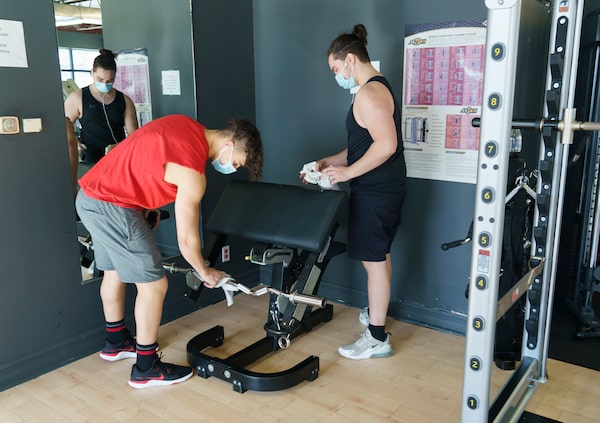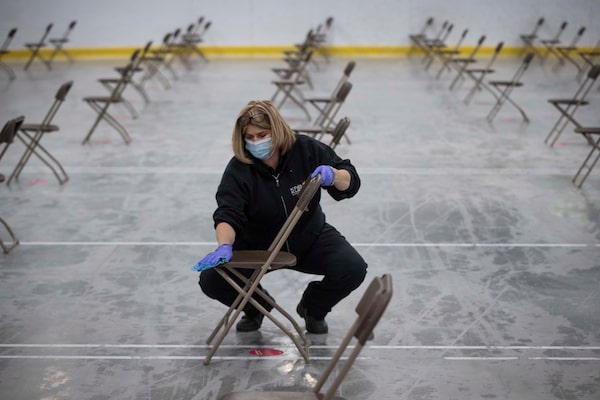
Customers clean the apparatus following a workout at a gym in Granby, Que. on March 8, 2021.Paul Chiasson/The Canadian Press
At the Confederation Centre Public Library in Prince Edward Island, returned books are quarantined for 72 hours. In Toronto, the library system’s COVID-19 protocol on its website requires that returned materials be set aside for “96 hours or more until they are safe to circulate.”
Every Loblaw banner store in Canada is still doing “increased” sanitization processes, including frequent deep cleaning of all areas of the store.
“In fact, we go above and beyond what was required,” said Loblaw director of corporate affairs, Mark Boudreau, adding that some of the grocery chain’s COVID-19 cleaning protocols might become permanent.
Across Canada, individuals and institutions are maintaining the same deep cleaning and product quarantining protocols that came to be expected at the start of the pandemic. But experts say that it’s time to move past “hygiene theatre” – or cleaning behaviours that give people a sense of security and protection, but are actually unlikely to reduce the likelihood of COVID-19 transmission.
And the environmental impact of disposable wipes, the cost of disinfecting supplies, and the burden on restaurant and retail employees to maintain strict COVID-19 cleaning measures, are further reasons to start being pragmatic – and stop wiping down groceries and mail.
Canada vaccine tracker: How many COVID-19 doses have been administered so far?
Am I eligible for a COVID-19 vaccine? The latest rules by province
“Part of the problem that we’re having, I think as infectious disease doctors and virologists, is [getting] people to understand that simply knowing that a virus is present in something on a surface, or in an aerosol, doesn’t mean that that’s an efficient way for the virus to get itself transmitted, because viruses undergo all kinds of changes that can affect its infectivity, its ability to bind to a receptor that is on a person that allows for infection,” said Dr. Gerald Evans, medical director of infection prevention and control at Kingston Health Sciences Centre and Queen’s University professor.
Dr. Evans added that one of the issues with disposable wipes is that they contribute to “the overall problems of trash.”
Dr. Peter Jüni, scientific director of Ontario COVID-19 Science Advisory Table, said that in public spaces and community settings outside of households, the risk of surface transmission is relatively low and can “easily be addressed through conventional cleaning – without deep cleaning, deep disinfection, and [by using] hand disinfectant.”
In outdoor public spaces, such as playgrounds, ultraviolet light also helps to decontaminate surfaces, Dr. Jüni said.
Dr. Evans referenced one German study that showed grocery stores as a source of any sort of COVID-19 transmission was “decidedly uncommon, again, probably related to the fact that people don’t really spend a lot of time in a grocery store,” he said.

Audra Wash wears a mask to protect her from the COVID-19 virus while cleaning chairs at the waiting area at the Invista Centre in Kingston, Ont., on Mar. 1, 2021.Lars Hagberg/The Canadian Press
But COVID-19 cleaning protocols – particularly in grocery stores – are comforting for some people, such as Toronto-based professional photographer and videographer Rob Stilez.
“Honestly, I think it’s mentally … relaxing, a little bit,” said Mr. Stilez, who received his first dose of the vaccine last month, but still carries a pair of disposable gloves in his back pocket and disinfects every mail-order package before letting it sit on his balcony.
For others, COVID-19 cleaning protocols have become a distraction.
Dr. Leighanne Parkes, an infectious disease specialist and microbiologist through McGill University and Jewish General Hospital who works in infection prevention and control, said “there’s a cognitive dissonance between reality and what you perceive as being safe.”
“Should we wipe our paperbacks in the library down, or … hold them in quarantine for 24 hours before we release them? I don’t think that probably plays a significant role in transmission,” Dr. Parkes said.
Rather, this focus on surface disinfection takes away from “what’s really important,” Dr. Parkes said, such as “improving ventilation in places where we know we have the highest risk of transmission, like our long-term care facilities, et cetera,” or reimagining physical space for individuals in workplaces and in institutions.
Mike Barber, a copywriter and editor who lives in Toronto, said he used to quarantine his cannabis shipments from British Columbia before deciding it just added to his anxiety.
Mr. Barber said he now thinks of the burden of COVID-19 cleaning for grocery store workers, retail workers and servers.
“People who are bearing the worst of it are people getting paid the least to do so,” Mr. Barber said. “And especially as the evidence is borne out [about transmission], I’ve been very curious to see when businesses in particular are going to stop those practices.”
While experts agree that hand hygiene should remain a lifestyle habit beyond the pandemic, and that getting vaccinated is the best form of COVID-19 protection, it’s time for hygiene theatre to come to an end, they say.
“I do think you know, regardless of vaccine, we probably can ease up on a lot of the cleaning of our environment,” Dr. Parkes said.
Our Morning Update and Evening Update newsletters are written by Globe editors, giving you a concise summary of the day’s most important headlines. Sign up today.